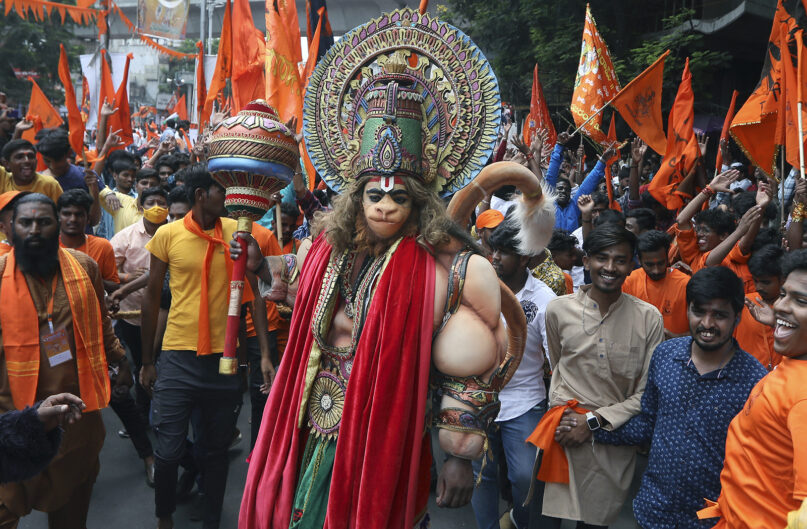(RNS) — When I put my toddler son to bed at night, he protests that he is afraid of the dark. Finally, when I turn off the lights, he points to a stuffed toy in his crib of a monkeylike avatar wearing a gold cap and holding a golden mace, and asks, “Will Hanuman protect me?”
It’s a question I’ve come to appreciate in my own life as well. As we mark Hanuman Jayanti — the celebration of the Hindu deity’s birth — on Thursday (April 6), the legend of the famous deity is a source of inspiration to me, as it is for millions of Hindus, Buddhists and Jains around the world.
Hanuman, who helps Lord Ram rescue his queen, Sita, is depicted in the Hindu Scriptures as a divine monkey, the son of Vayu, the wind god. Hanuman is often portrayed across the world as a figure with immense strength, with the ability to move mountains (literally) in order to save the world and restore dharma, or righteousness.
Like many Gen X American Hindus raised entirely in the United States, I first heard of Hanuman in the stories my grandmothers told me and in the comics my relatives would bring from India on their visits. Hanuman was the equivalent of a superhero, a sentiment my friend Sanjay Patel would capture years later in his Oscar-nominated animated short, “Sanjay’s Super Team.”
When I was 13, my grandfather gave me a silver ring depicting Hanuman, in a scene from the sacred text the Ramayana, carrying a mountain and flying to rescue Lakshman, Lord Ram’s younger brother, who had been wounded in battle. The mountain, in the text’s telling, had herbs that could save Lakshman and Hanuman brought the entire mountain to the battlefield to help.
That story of Hanuman’s heroism is popularized in Hinduism, Buddhism and Jainism, with the symbol of Hanuman flying with the mountain common in countries such as Cambodia, Thailand, Vietnam and Indonesia.
As much as I was devoted to Hanuman as the iconic figure of heroism, only much later in life did I come to fully appreciate Hanuman’s true meaning. As in the case of all Hindu deities, Hanuman’s physical prowess is secondary to his embodiment of the qualities of selfless service, devotion and humility — all things I aspire to but frequently fall short of.
In the Ramayana and the Ramcharitmanas, another account of the life of Lord Ram, Ram tells Hanuman to that he will grant him anything he asks. Hanuman replies: “My wish is to only serve you.”
That unconditional dedication is the epitome of bhakti, or devotion, which Hindus are charged to practice on a daily basis. It’s why in many Indo-Caribbean and South African Hindu households, the symbol of devotion is a flag of Hanuman atop a mountain, mace in hand. In the 17th century poem Hanuman Chalisa, composed by St. Tulsidas during his imprisonment by the Mughal emperor Akbar, the poet asks Hanuman to stay always in the heart of all of his devotees.
When my mother was battling terminal cancer and my own faith started to waver, I read the Chalisa daily, reminding myself to always keep Hanuman in my heart — no matter what.
After my mother’s passing, I began to embrace the aspirational qualities Hanuman embodied. The idea of serving others, staying loyal to those around me and trying to act with humility became my core principles, even if I couldn’t live up to those principles all the time. Hanuman’s infallibility as a devotee didn’t highlight my fallibility; instead, it motivated me to strive to be better as a son, a husband, a brother and eventually a father.
Today, when my son plays with his Hanuman toys, my wife and I tell him the stories about Hanuman’s faith, to remind him that the qualities of goodness are ever enduring no matter how he chooses to follow his own spiritual journey. That’s why, when he asks the question about whether Hanuman will protect him, I don’t hesitate to answer.
“Yes, he will. Always.”
(Murali Balaji is a journalist and a lecturer at the Annenberg School for Communication at the University of Pennsylvania. He is the editor of “Digital Hinduism” and author of “The Professor and the Pupil,” a political biography of W.E.B. Du Bois and Paul Robeson. The views expressed in this commentary do not necessarily reflect those of Religion News Service.)





